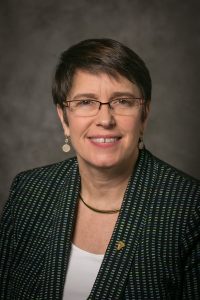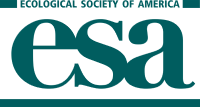
2018 was a year of transition for ESA. I was honored to have been chosen by the Governing Board to take the helm after ESA’s third executive director, Katherine McCarter, retired in January. During 20 years of exemplary service, Katherine led the staff and worked with members to create robust programs and put ESA on solid financial ground. Special thanks to ESA chief financial officer Elizabeth Biggs, who served as interim executive director from January until April. One of my primary objectives as executive director will be to build upon Katherine’s legacy and bring my expertise as a scientist and association executive to strengthen ESA.
In its 103rd year of existence, ESA continues to evolve to become an organization where volunteer leaders are supported by professional staff to manage the Society business and support the science and the community. In 2018, financial results were strong. ESA has strengthened our productive journal publishing partnership with Wiley. The publications program continued to grow with Ecosphere publishing more than 450 articles, a record. More than 3,500 scientists participated in the Annual Meeting in New Orleans. We continued to contribute to ESA’s financial health by adding to our reserves, currently at $3.7M. ESA still has some distance to go to reach its goal of one year’s operating budget in reserves, but we are well on our way.
2018 was also marked by some important milestones in ESA programs. Highlights include:
- ESA formed a task force in early 2018, chaired by past president Rich Pouyat, to examine ESA’s certification program. The task force conducted a review of other societies’ programs, and contracted a consultant to conduct interviews and surveys with existing, former, or potential members to evaluate the current program with the aim of increasing the value of certification and attracting new applicants. A report on the survey findings and recommendations will be presented to the Governing Board this spring. The potential expansion of the certification program could be a key component for extending the tent of ESA.
- As part of our effort to fulfill the communications goal from the 2016 strategic plan, we acted upon feedback from the broad membership survey carried out in 2017 and have instituted new communication mechanisms. We hired Jon Miller as director of ESA’s Office of Member Services to coordinate staff efforts that provide robust member benefits and services, as well as Section and Chapter support.
- In June, I co-authored an editorial with ESA past president Jill Baron to call for ESA members to get involved in their society. We held an open call for new volunteers to serve on standing committees, launched a new community platform, ECO, and created new communications for Section and Chapter leaders. We encourage everyone to get involved: ESA is your society!
- ESA continues to strive to be an inclusive community. The Governing Board updated ESA’s Code of Conduct for events in 2018, and established formal procedures for handling ethics and misconduct violations. The code was displayed prominently at the Annual Meeting, where we also offered bystander training.
- For the first time, ESA held a Diversity Forum at the Annual Meeting.
- ESA launched a new focus on career resources and organized a Career Fair at the Annual Meeting. Scientists of all career levels and pathways, but especially students, took part in workshops, resume reviews, networking events and more. We look forward to continuing to expand this key event.
- I have worked with the presidential “chain” to help improve board communications and continuity of governance. In November, I supported efforts by President Huenneke to launch a planning effort to revisit ESA’s long-term strategies and governance documents. These efforts will extend into 2019 and help set the course for a strong future for ESA.
These continue to be challenging times for the ecological sciences, with threats to government support of science and the lack of understanding by some members of the public of the impact of climate change on ecology and the environment. The ESA Public Affairs Committee, and the supporting Public Affairs Office, continued to be a vocal and visible advocate. ESA originated or participated in the writing of 38 letters to the federal government in response to policy actions and funding with the potential to impact scientific research or the environment. These letters and statements ranged in topics from the Clean Water Rule to the integrity of science.
ESA also responded to the natural disasters occurring in 2017, particularly Hurricanes Irma and Maria and the Houston floods. We successfully set up a scientist-to-scientist bulletin board with offers of assistance for those affected by these events and hope to continue this practice in the future. In 2018, ESA expanded and renamed the Graduate Student Policy Awards to honor Katherine McCarter, and supported 10 students to travel to DC for training and visiting Congressional members.
Since arriving in April of 2018, I have learned so much from all of you and been inspired by the collective work of volunteer leaders, staff, and members. I want to thank you for your warm welcome. I have also met many members that support programs above and beyond their dues and encourage you to join me as a donor. Although ESA is healthy financially, every additional dollar that we can raise enables us to expend our programs and to reach more members, students and other stakeholders. I am thrilled to be part of the community and pledge to build on years of creative, thoughtful leadership and hard work to help guide ESA into a vibrant future.
